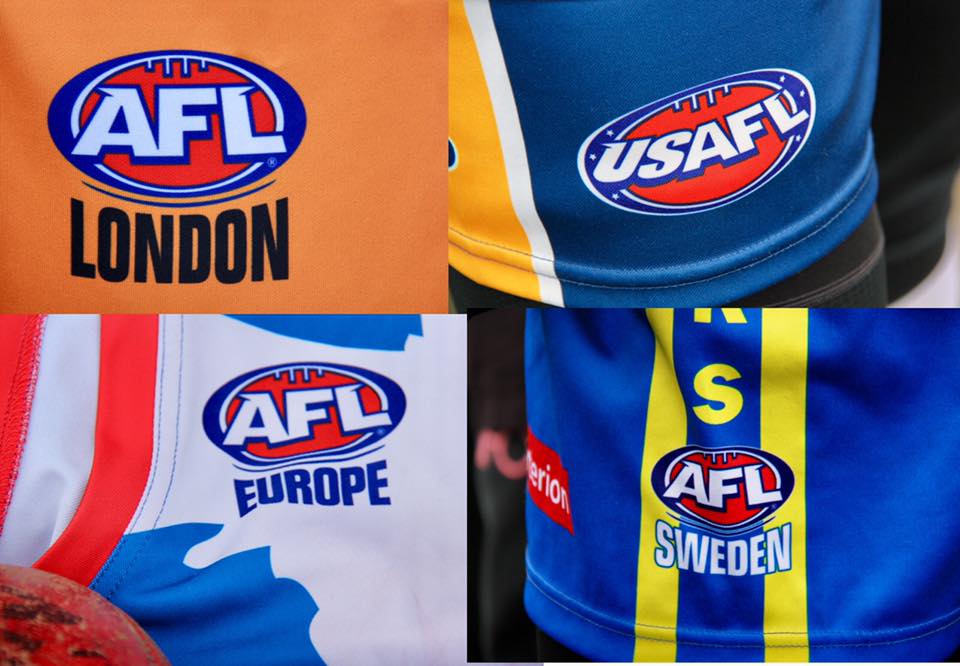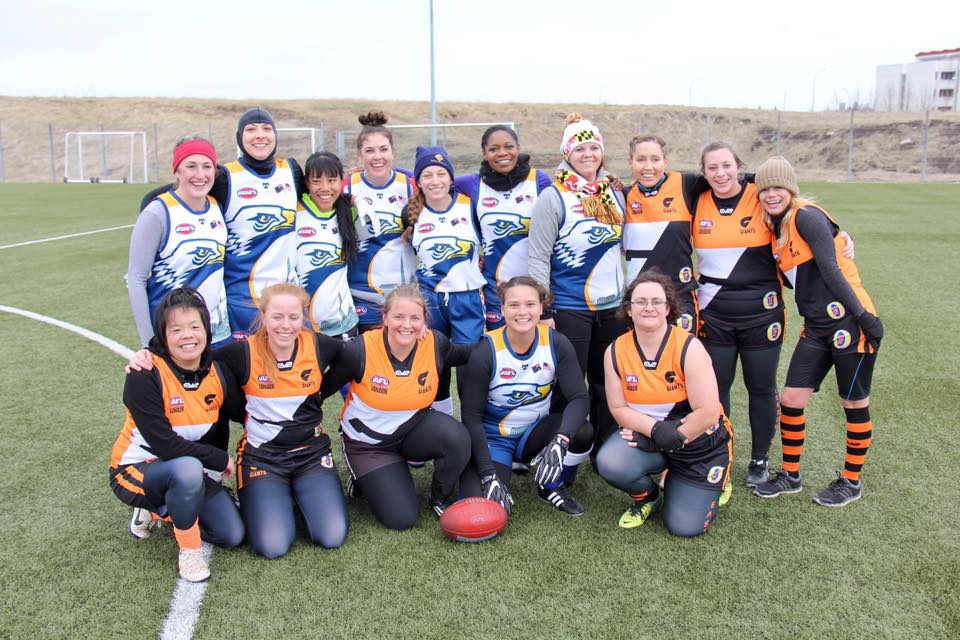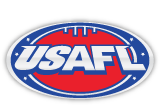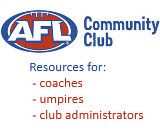The 2017 Arctic Cup (or How We Became Vikings in 72 Hours)
|
|
By Molly Halberstadt and Ryan Cartwright
"Who thought footy would bring me to f***ing Iceland?" says a chilly Ross Levesque, bitterly surveying his drenched apparel against a backdrop of rugged rocky terrain and steep dark hills rising in the distance.
But it wasn't strictly footy that brought him to Iceland - rather, his brother Jay, whom Ross introduced to footy in 2003 and who is now a USA Revolution veteran, was the larger factor for Ross' short trip. The two faced off in the Arctic Cup, with Ross playing for a combination Swedish/Icelandic team and Jay for the Baltimore Washington Eagles.
While the Eagles triumphed over their many opponents to take home the Arctic Cup, the brothers were far from the only ones bridging the gap of opposing teams at the northernmost Australian Rules Football international tournament ever played: the inaugural Arctic Cup on March 26, 2017 in Reykjavik, Iceland.
Though all attendees played for specific national banners, the player nationalities spanned a wide spectrum; in addition to the typical Australian presence across teams, the Swedish team consisted of at least half Americans, and other teams included French, Irish, and copious other nationalities in the basket of accents and origins. A truly international tournament was linked by numerous players; among them the Levesque brothers, New York Magpies’ Ashley Singer defecting to the London team for the next year, Ryan Cartwright having played with the London Giants whilst there on business, Canada’s “Dutchie” on the American KC Power, and several others. In fact, early discussions of the tournament were met with reactions on social media like “so let me get this straight… the Americans are playing Australian Rules Football against the English in the Grand Final of the Arctic Cup in Iceland?” Indeed, this tournament’s interconnected nature represents not only the spread of footy across the globe, but also an intersecting world footy community coming together for a new iconic competition and hopefully a pre-season footy tradition.
 In the face of adversity, together we prevailed over our common enemy: Icelandic weather in March. From the moment we touched down in Keflavik Airport, the sustained winds and freezing rain left little doubt that the impending tournament would be a miserable affair. Like the bare boreal birch branches, we spent Thursday and Friday shivering under the gray sky as the sharp wind sent sleet soaking through our raincoats.
In the face of adversity, together we prevailed over our common enemy: Icelandic weather in March. From the moment we touched down in Keflavik Airport, the sustained winds and freezing rain left little doubt that the impending tournament would be a miserable affair. Like the bare boreal birch branches, we spent Thursday and Friday shivering under the gray sky as the sharp wind sent sleet soaking through our raincoats.
We were pleasantly surprised when Saturday dawned almost sunny and barely overcast as we made our way to the grounds. With a midmorning start at 10am, the temperature read 4 degrees Celsius, but felt closer to -1 on the turf at Iceland’s Valur Sports Association. A soccer field in the capital’s suburbs had been fashioned into a makeshift footy pitch, with soccer goal posts designating the lines between goals and behinds, and the rectangular turf outlined with soccer dimensions. The comparatively decent weather subsisted throughout the matches, excepting a brief few moments of hail and cyclone winds let loose by Viking gods during the Grand Final.
As the tournament commenced, Sweden’s Malmo Maulers combined with Iceland’s budding Reykjavik Bulls as a formidable Scandinavian squad against USAFL’s Baltimore Washington Eagles, the combined Halifax & Quebec Atlantic Pirates, and the Southeast London Giants. The Atlantic Pirates were led by crafty rover Jonah Scott, whose uncanny footy instincts hugely benefited the Canadians – but not enough to defeat the London Giants’ unified teamwork, captained by Greg Ross. The Giants played as one solid unit against Canada and took down the Scandinavian combine in an impressive knock-down, drag-off fight. Scandinavia’s brave efforts led to individual victories and an excellent display of skill but the talented team was overpowered by their rivals and, like their British and Canadian counterparts, ultimately eliminated by a cohesive Baltimore Washington team playing some of their best footy ever.
 The Baltimore Washington Eagles started slow but eventually took home the tournament, going 3-0 against London (20-8), Scandinavia (50-25), and Canada (39-21), with the Lady Eagles persevering over their London opponent as well (23-19). The Giants men shot out to an early 7-0 lead, but were unable to sustain their kicking power without the wind as the Eagles roared back in the second half. The Eagles’ captain and Revolution player Jay Levesque’s spectacular play throughout the tournament earned him Best On Ground – even one London player’s strategic mooning and subsequent heckling of Levesque’s skin-tight leggings couldn’t make him miss a shot. Jay was joined by Revolution hopefuls Ryan Cartwright and Zac Taylor as they dominated the forward line.
The Baltimore Washington Eagles started slow but eventually took home the tournament, going 3-0 against London (20-8), Scandinavia (50-25), and Canada (39-21), with the Lady Eagles persevering over their London opponent as well (23-19). The Giants men shot out to an early 7-0 lead, but were unable to sustain their kicking power without the wind as the Eagles roared back in the second half. The Eagles’ captain and Revolution player Jay Levesque’s spectacular play throughout the tournament earned him Best On Ground – even one London player’s strategic mooning and subsequent heckling of Levesque’s skin-tight leggings couldn’t make him miss a shot. Jay was joined by Revolution hopefuls Ryan Cartwright and Zac Taylor as they dominated the forward line.
Ultimately, the team with the right wind advantage secured the game; at one point during the women’s match, the Lady Eagles’ ruck (borrowed from the NYC Magpies) Andrea Hargrave kicked directly into the sharp wind and watched the strong gusts carry her perfect kick completely off the mark. Hargrave was hardly the only victim of sustained winds – the gales blew the strongest during the second half of the final, making it nearly impossible to kick further then 20 meters into the wind without a fittingly Australian boomerang effect. However, the Lady Eagles achieved a three goal comeback to take the game, playing with the wind on their side in the second half of their abbreviated match.
Volunteer umpires truly made the tournament possible, calling a clean and fair game: special thanks to AFL London chairman David Field, Baltimore Washington Eagles Aussies Matthew Byrne and Kit Drury, as well as Friðgeir Torfi Ásgeirsson for facilitating the tournament. Additionally, Iceland’s national rugby coach Ranald Haig secured indoor facilities at Sporthúsið on the night prior for those hoping to practice a kick, and reserved a private room at the bar Hressó in downtown Reykjavik.
As the tournament came to an end, festivities resumed at Hressó, where the teams once again mPhotoingled and cast aside all competition from earlier in the day, to enjoy the trophy ceremony as one unified international team, and to begin talks for next year’s Arctic Cup. Of course, in its tangible form, the coveted “Arctic Cup” was more “Arctic Hollowed-Out Horn” than a standard beer receptacle, but we drank from it nonetheless. Like the Iceland Vikings of old – renowned throughout history for their Aussie Rules Football passion, of course – we battled furiously for that trophy horn, with myriad accents and languages shouting instruction as our frozen fingers clutched damp footballs in the light hail under the glowing expanse of the Aurora Borealis.
Stay tuned for 2018’s Arctic Cup 2.0!
Photos credit: Anthony Orford
|
|
|






